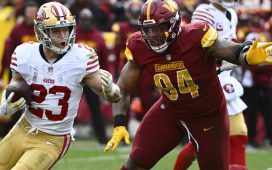Gonzaga men’s basketball coach Mark Few argued Wednesday that various state laws regarding college athlete compensation will lead to unfair advantages in recruiting.
Speaking at a hearing regarding athletes’ rights convened by the Senate Committee on Commerce, Science and Transportation, Few said that a system without a federal law to protect the recruiting environment could lead to “disastrous” consequences.
Without a national standard, the six states that have signed laws allowing athletes to monetize their own names, images and likenesses (NIL) as of July 1 give schools in their states a clear edge in recruiting.
NCAA president Mark Emmert reiterated on Wednesday that he expects the NCAA to pass its own NIL legislation by the end of June, though state laws would still supersede that. It would be an attempt at fairness and a way to avoid the situation Few and others laid out during the hearing.
Coaches in Florida, Alabama, Florida, Georgia, Mississippi and New Mexico can sell prospective players on the fact that they will be able to sign endorsement deals, participate in paid social media influencer campaigns and host camps to make money in three weeks.
Recruits will always care about the coaching staff, the campus and everything else that goes into the decision-making process, but certain schools are also selling an opportunity to cash in during perhaps the most lucrative window of their careers.
That is what Few believes is going to be a problem.
“At this point, this is not an issue the NCAA or individual states can fix,” Few said. “We can’t run competitive fair championships if every state has a different rule…Only action here by Congress can maintain some sort of semblance of a level playing field. A consistent national law is critical.”
Few’s program is located in Washington, a state that has not signed a state NIL bill into law. Gonzaga has built itself into a college basketball powerhouse, but at its core is still a private Jesuit school in a small Division I conference.
Few said that when he first started working at Gonzaga in 1990 as a graduate assistant, the athletic department was facing such a dire financial situation that it considered dropping down a division or reducing the number of sports offered. There are rules in place, Few said, that allow a place like Gonzaga to have a chance to compete with the bluebloods, such as the same scholarship limits.
Neighboring states having laws that put money in athletes’ pockets while his state doesn’t would not give the Zags that same chance.
“In some ways, it’s impossible to project. But in many ways it isn’t,” Few said. “It will never be the same. We recruit nationally, even internationally. To not have the ability to compete on some sort of a level playing field with people who can provide monetary gifts, endorsements, things like that — it would put us at a disadvantage that we couldn’t make up.
“The story of Gonzaga playing in two national championship games would never have happened if this was around prior.”
Howard University president Dr. Wayne Frederick and Senator Roger Wicker (R-Miss.) both echoed similar concerns. This is one of the main reasons coaches and administrators fear July 1 — and why they continue to ask Congress for help coming up with a national standard that would supersede state laws.
Based on comments made by various Senators on Wednesday, it appears there are two camps of legislators: Those who want an NIL-specific bill ready to go as soon as possible, and those who want to take more time to create broader legislation that addresses NIL but also topics like post-eligibility healthcare coverage.



